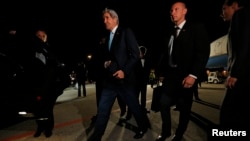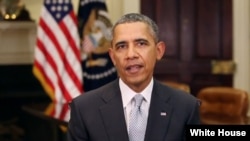European countries and the United States are threatening Russia with more sanctions unless it takes steps at the Geneva meeting to show it will de-escalate the conflict in Ukraine, although officials say they expect no breakthrough.
So far, diplomacy has failed to keep up with events on the ground, with Russia's partisans seizing control of territory before Western countries can formulate a response.
Bloodshed has been limited so far during the uprising in the east, with two people killed on Sunday, including a member of the Ukrainian state security forces shot dead. Kiev says it is doing all it can to avoid any shooting.
The United States and European Union have so far imposed visa bans and asset freezes on a small number of Russian individuals, a response that Moscow has openly mocked. However, the Western states say they are now contemplating more serious measures that could hurt Russia's economy more broadly, which could be put into place shortly after Thursday's Geneva meeting.
"What I have said consistently is that each time Russia takes these kinds of steps that are designed to violate their sovereignty, that there are going to be consequences,'' U.S. President Barack Obama said on Wednesday in an interview with CBS. Using words unheard since the Cold War, he said the United States had stronger conventional military forces than Russia, and neither side wanted a conflict. ``We don't need a war,'' he said.
Western countries have repeatedly made clear they are not prepared to fight for Ukraine, but the NATO alliance announced military deployments on Wednesday to beef up defences of member states such as Poland and the Baltic countries, which feel threatened by Russian action nearby.
Upon arriving in Geneva on Wednesday, Ukrainian Foreign Minister Andriy Deshchytsia said there was still time for negotiations to ease tensions with Russia.
"I think that we still have a chance to de-escalate the situation using the diplomatic means,'' he said. "And we will try hard. We are trying hard - not only Ukraine - but also the United States. However, the time is now, not only to express the concerns, but to look for a more concrete and adequate response to Russia's plans and actions.''
Kiev and the West believe Russian agents are directing the insurgency in the east. A U.S. official said Washington was looking for evidence in Geneva that Russia would stop.
"The idea here is that they would stop aiding and abetting and supporting these separatists and that they would pull their troops back from the borders,'' the official told reporters as Secretary of State John Kerry flew to Geneva.
The European Commission took a step towards preparing for wider sanctions, handing documents to EU member states on Wednesday explaining the potential impact on their economies of stricter trade and financial measures, diplomats said.
The documents examine energy, finance, trade and other areas. A number of EU countries that rely heavily on Russian gas supplies are nervous about possible retaliation from Moscow, and at least one EU diplomat said the measures had to be balanced.
So far, diplomacy has failed to keep up with events on the ground, with Russia's partisans seizing control of territory before Western countries can formulate a response.
Bloodshed has been limited so far during the uprising in the east, with two people killed on Sunday, including a member of the Ukrainian state security forces shot dead. Kiev says it is doing all it can to avoid any shooting.
The United States and European Union have so far imposed visa bans and asset freezes on a small number of Russian individuals, a response that Moscow has openly mocked. However, the Western states say they are now contemplating more serious measures that could hurt Russia's economy more broadly, which could be put into place shortly after Thursday's Geneva meeting.
"What I have said consistently is that each time Russia takes these kinds of steps that are designed to violate their sovereignty, that there are going to be consequences,'' U.S. President Barack Obama said on Wednesday in an interview with CBS. Using words unheard since the Cold War, he said the United States had stronger conventional military forces than Russia, and neither side wanted a conflict. ``We don't need a war,'' he said.
Western countries have repeatedly made clear they are not prepared to fight for Ukraine, but the NATO alliance announced military deployments on Wednesday to beef up defences of member states such as Poland and the Baltic countries, which feel threatened by Russian action nearby.
Upon arriving in Geneva on Wednesday, Ukrainian Foreign Minister Andriy Deshchytsia said there was still time for negotiations to ease tensions with Russia.
"I think that we still have a chance to de-escalate the situation using the diplomatic means,'' he said. "And we will try hard. We are trying hard - not only Ukraine - but also the United States. However, the time is now, not only to express the concerns, but to look for a more concrete and adequate response to Russia's plans and actions.''
Kiev and the West believe Russian agents are directing the insurgency in the east. A U.S. official said Washington was looking for evidence in Geneva that Russia would stop.
"The idea here is that they would stop aiding and abetting and supporting these separatists and that they would pull their troops back from the borders,'' the official told reporters as Secretary of State John Kerry flew to Geneva.
The European Commission took a step towards preparing for wider sanctions, handing documents to EU member states on Wednesday explaining the potential impact on their economies of stricter trade and financial measures, diplomats said.
The documents examine energy, finance, trade and other areas. A number of EU countries that rely heavily on Russian gas supplies are nervous about possible retaliation from Moscow, and at least one EU diplomat said the measures had to be balanced.






